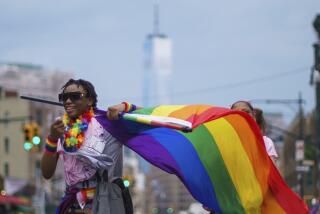TV Commercial Featuring Gay Couple Creates a Madison Avenue Uproar
- Share via
A groundbreaking television commercial that depicts two gay men buying furniture is stirring passionate reactions from detractors and supporters--and causing the kind of commotion seldom seen on Madison Avenue.
Last week, furniture retailer Ikea began airing an ad in several East Coast markets that shows two clearly identifiable gay men shopping for a dining room table at an Ikea store. It is the first time gays have been openly portrayed in a mainstream TV spot. Ikea has since been swamped with hundreds of phone calls and letters--some applauding the company, but many others demanding that the ad be axed.
But the spot--which has not been broadcast on the West Coast--won’t be yanked. “It will continue to air over the next year,” said Peter Connolly, director of marketing for Ikea’s Philadelphia-based East Coast division. A few East Coast Ikea stores have been targeted by angry protesters who have jammed phone lines since last week. One store in Hicksville, N.Y., was briefly evacuated last week after a bomb scare. No bomb was found.
At issue is the homosexual relationship between the two men in the Ikea ad, who talk about how buying the dining room table together shows their commitment to each other. If it becomes clear to other major marketers that Ikea’s business is not harmed--and perhaps even helped--by the ad, it could profoundly affect the way major advertisers speak to gays and lesbians.
“It is one small step for Madison Avenue, but it is one giant leap for the gay community,” said Fred Danzig, editor of the trade magazine Advertising Age. “There has never been anything like this before.”
Danzig expects that advertisers from airlines to financial services may eventually follow Ikea’s lead and feature identifiable gays in TV ad campaigns. Until now, only a handful of major advertisers have acknowledged the gay lifestyle in ads--but almost exclusively in print campaigns, where the impact is usually far more subdued.
Firms like Benetton, Banana Republic and Calvin Klein have all used gay imagery in ads placed in mainstream publications. At the same time, more than a dozen major advertisers--including American Express and Apple Computer--have gay-targeted ads running in popular gay and lesbian publications.
The Ikea ad depicts “an aspect of gay life that people never see: our daily lives,” said Ellen Carton, executive director of the New York chapter of the Gay and Lesbian Alliance Against Defamation. Instead of showing gays and lesbians marching at gay rights rallies or suffering from AIDS, the Ikea ad “humanizes us,” she said. “The importance of that cannot be overstated.”
But a storm of protest is rising on the right. “Openly promoting homosexuality will upset America’s mainstream and cost the company business,” said Robert Knight, director of cultural studies at the Family Research Council, a conservative, Washington-based think tank.
Corporate image experts say that provocative portrayals seen on television screens or at the movies can elicit unusually strong reactions from the public because these images are so often much larger--if not more realistic--than on the printed page.
Last month, actor Tom Hanks won the best actor Oscar for his portrayal of an AIDS-infected attorney fired from his job in the film “Philadelphia.” A recent episode of the TV show “Roseanne” drew record ratings when it showed a lesbian--played by Mariel Hemingway--kissing Roseanne Arnold in a lesbian bar.
“Why has the ad industry waited so long?” posed Donny Deutsch, chief executive of Deutsch Inc., the New York agency that created the Ikea ad. “It’s simple: You have a lot of advertisers afraid of backlash.”
Advertisers quietly fear that by trying to appeal to gays and lesbians so publicly, they may antagonize their core markets. Even Ikea officials concede that the company has no plans to air its latest TV spot on the West Coast until the company establishes more of a customer base here. Ikea opened its first West Coast store just three years ago.
But as the 1990s emerge as the decade of niche marketing, a growing number of advertisers are expected to increasingly target gays, who, most surveys show, often enjoy higher disposable household income levels than many other consumer groups.
“Niche marketing is the way of life in America,” said Eugene Secunda, marketing professor at Adelphi University in Garden City, N.Y. “But a number of other gay-oriented ads will soon hit the airwaves, and there may very well be a backlash from the gay community itself.” Indeed, there are some gays who seriously question the motives behind the commercial.
“It smacks of tokenism,” said Jeff Yarbrough, editor-in-chief of the Advocate, a national gay and lesbian magazine. “If the intent of the ad has been to garner media attention, well, it’s done a brilliant job of that. But I wonder, what are their real motives? What is Ikea’s corporate policy on gays?”
The company has no detailed corporate policy on gays and lesbians--nor for that matter does it know how many of its customers are gay, said East Coast marketing chief Connolly.
“We’re not trying to promote a certain lifestyle or make a statement,” Connolly said. “This is just part of our overall strategy to try to speak directly to all kinds of customers.” Ikea is also airing other spots, including one featuring a divorced woman and another with a retired couple.
The ad with the two gay men “could cost us some customers,” Connolly said. “But it shows Ikea is for everyone. This will make us a stronger company.”
Briefly . . .
The Los Angeles agency Schroffel & Associates has picked up the estimated $600,000 account for Los Angeles-based Fatburger. . . . Los Angeles-based Speer, Young & Hollander has picked up the $500,000 ad business for the Los Angeles maker of electronic components, Time Electronics Inc. . . . Penthouse Comix, a series of racy comic books supported by advertising, will debut later this month with a 96-page issue. . . . The Los Angeles agency Stranger & Associates has lost the $3-million account for Luxor, the Las Vegas casino-hotel, which is reviewing the account. David Lauren, son of designer Ralph Lauren, plans to debut Swing magazine this fall, a lifestyle publication targeted at people in their 20s. . . . Madge the Manicurist, the last spokeswoman for Palmolive dishwashing detergent, has been replaced by co-stars of NBC’s prime-time series, “The Mommies,” Caryl Kristensen and Marilyn Kentz. . . . A new public service billboard, created by the San Diego agency Di Zinno & Partners, shows a handgun next to this headline: “Welcome to Boomtown. Over 25,000 new Handguns in San Diego each year.”
More to Read
Inside the business of entertainment
The Wide Shot brings you news, analysis and insights on everything from streaming wars to production — and what it all means for the future.
You may occasionally receive promotional content from the Los Angeles Times.










